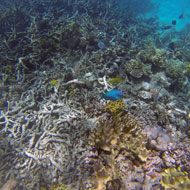Great Barrier Reef suffered ‘catastrophic die off’ in 2016 heatwave

In ‘bleaching’ events, corals expel the algae living in their tissues and turn completely white.
Scientists say 30 per cent of corals were lost across the Great Barrier Reef during a nine-month marine heatwave in 2016.
A study published in the journal Nature suggests the most severely affected part was the northern third. Twenty-nine per cent of the reefs lost two-thirds or more of their corals, which transformed their ability to sustain full ecological functioning.
Warmer water temperatures can cause coral ‘bleaching’, where corals expel the algae living in their tissues and turn completely white. When this occurs, corals can either survive and regain their colour slowly as the temperature drops again, or they die.
Scientists found the amount of coral death they measured was closely linked to the amount of bleaching and the level of heat exposure.
The Great Barrier Reef also experienced severe heat stress and bleaching in 2017, this time affecting the central region.
“We’re now at a point where we’ve lost close to half of the corals in shallow-water habitats across the northern two-thirds of the Great Barrier Reef due to back-to-back bleaching over two consecutive years,” said Professor Sean Connolly of Coral CoE at James Cook University.
Professor Terry Hughes, director of the ARC Centre of Excellence for Coral Reef Studies, added: “But, that still leaves a billion or so corals alive, and on average, they are tougher than the ones that died. We need to focus urgently on protecting the glass that’s still half full, by helping these survivors to recover.”
However, Prof Hughes said while the Great Barrier Reef is “certainly threatened”, it is “not doomed if we deal very quickly with greenhouse gas emissions”.
Scientists warned that failure to deal with climate change, allowing global temperatures to rise far above 2ºC, will dramatically alter tropical reef ecosystems and undermine the benefits they provide to hundreds of millions of people.



 RCVS Knowledge has welcomed Professor Peter Cockcroft as editor-in-chief for Veterinary Evidence.
RCVS Knowledge has welcomed Professor Peter Cockcroft as editor-in-chief for Veterinary Evidence.